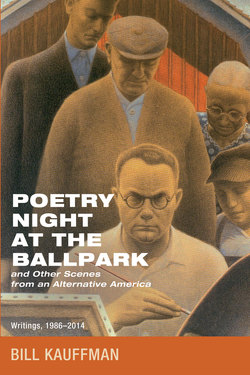Читать книгу Poetry Night at the Ballpark and Other Scenes from an Alternative America - Bill Kauffman - Страница 38
На сайте Литреса книга снята с продажи.
My Pen Pal Gore Vidal
ОглавлениеThe American Conservative, 2012
Now he belongs to the Ages. . . .
Well, why not? Edwin Stanton’s grandiloquent sendoff for the martyred Lincoln applies to Gore Vidal, author of the best fictive treatment our sixteenth president is ever likely to get. Plus it would have appealed to Gore’s fair vanity.
Gore Vidal’s favorite subject was his country. From Aaron Burr and Daniel Shays to Eugene V. Debs, America and its protagonists were his. This land was made for you and me? Of course it was.
So many healthy springs once fed our politics: they were rural, populist, patrician, pacifist, libertarian, anti-monopolist, prairie socialist, Main Street isolationist. Gore Vidal was explicator, dramatist, and even avatar of these American currents—which have no place in the dreary humorless social-democratic textbook history which bores our children and suffocates our discourse.
On a Sunday afternoon of torrential rains and crashing thunder (sound effects supplied by the Almighty in winking tribute to the anti-theist Vidal) I sat down and read through the sheaf of letters constituting our long epistolary friendship.
Each missive arrived in a pale blue envelope bearing the return address “La Rondinaia/Ravello (Salerno)/Italy.” His tone was often light self-mockery, unless the subject was, say, Arthur Schlesinger Jr. (Amused by Schlesinger’s surprisingly evenhanded review of one of my books, Vidal wrote, “As no bandwagon is complete without ‘there is this pendulum’ clinging to its buckboard, you seem to have launched a juggernaut out of Batavia.” Not exactly.)
Gore’s “favorite US pol (in my lifetime, that is)” was Huey Long, who had promised to make General Smedley “War is a Racket” Butler his Secretary of (Anti?) War. Cue the assassin’s bullet.
Vidal was an aristocratic populist. It was as if Henry Adams had fallen for William Jennings Bryan.
“As always, the unconsulted people are cowardly isolationists,” mused Gore as yet another of our endless wars began. Left-right rumblings against the empire heartened him: “They are terrified that anti-imperials will get together and revive America First, no bad rallying cry.”
I tried to get him to run in the 1992 Democratic presidential primaries, but he demurred: “If I had the energy, I’d make Huey Long seem like Robt Alphonso Taft—But too much sand’s slipped through the hourglass.”
While he saw the value of devolving power from the capital to the provinces, Vidal maintained an independent liberal’s skepticism of my decentralism, asserting that “if a state, exercising its rights, should wish to execute all spinsters over forty (my father’s dream!), then a Power Higher”—presumably a Bill of Rights-enforcing federal government—“must protect the minority from the majority.”
He enjoyed the sound of my hometown, and so his letters are filled with exhortations to “Preserve Batavia” and “Hail Batavia.” A decade ago he told me he was preparing to write a “counter-book” to my Dispatches from the Muckdog Gazette, but when one hits one’s octage, energy flags.
Vidal’s sense of place encompassed not only Ravello but his native Hudson Valley, especially his place of birth, West Point, of which he wrote: “what I find intolerable is the presence of women. Boys don’t like girls around when they do boy things. Fortunately, we’ll never again win or, perhaps, fight a war based on the bonded squad. Girls with lasers in outer space will prevail.”
He rather liked the current laser-pointing schoolmarm, Hillary Clinton. When she visited him in Italy, he found her “unexpectedly droll and (expectedly) quick.” Curiously, the late Carl Oglesby, who headed SDS when it was healthily rebellious (before the Weathermen blew it apart), also insisted to me that Hillary, who had admired Carl in her Goldwater Girl goes Left phase, was sharp. In public, at least, she hides her little light well.
Another name from the ’90s, Newt Gingrich, has praised Vidal’s Lincoln, and Vidal had a soft spot for Newt, too. In early 1995 he predicted that “Newt will self-destruct but he’s the blueprint for the 1st (post-Lincoln) dictator—New Age, spacey, Fun.” Beats Dick Cheney.
Gore’s last line in his last letter to me, after predicting that “the approaching economic collapse” will “stop the wars,” was “I’m always an optimist!”
Maybe not, but he was always a patriot. With slashing wit and Adamsian erudition, Gore Vidal, in his essays and historical novels, lit roads not taken, the America we might have had. Not a bloated bullying arrogant superpower but a modest republic whose citizens—not subjects—cultivate their own gardens.
That’s what Gore Vidal wanted. That’s why the empire-lovers hated him. Yet a century hence, Americans will still read, with pleasure and profit, for laughs and for edification, Burr and Lincoln and Screening History and those magisterial essays.
So long, Gore. I’ll be reading you in all the old familiar places.
